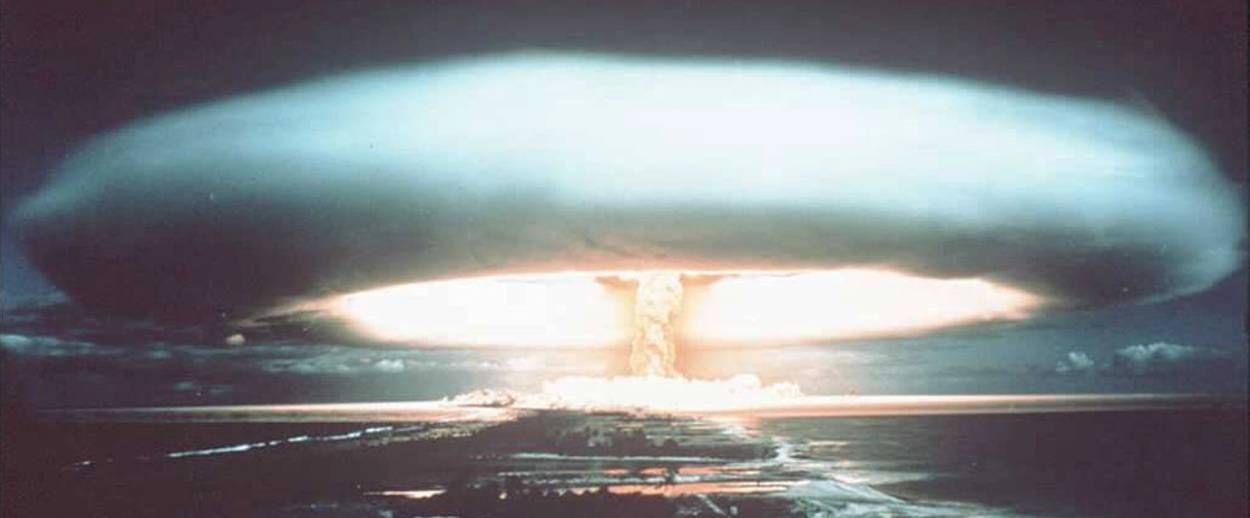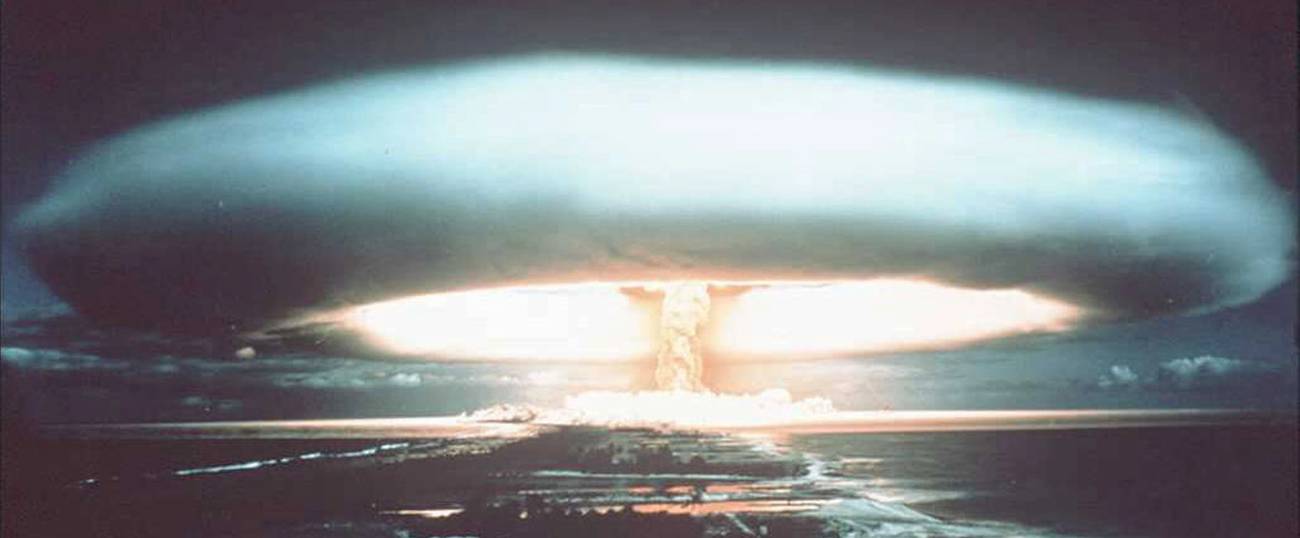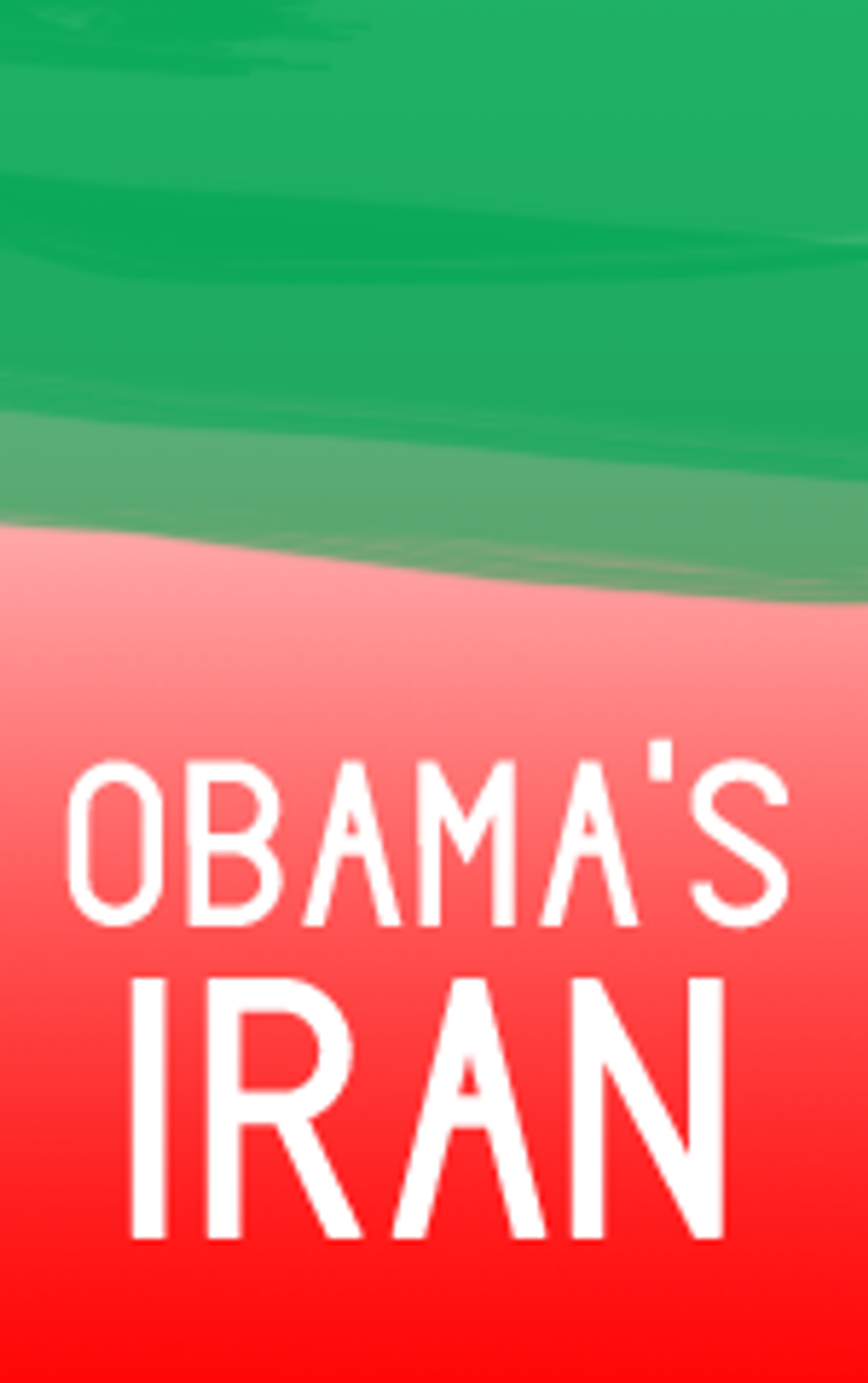Jewish Perspectives on Nuclear Weapons—and Deterrence
As Iran negotiates its nuclear deal, a look back at decades of debate by rabbis, politicians, and philosophers about the ethics of atomic warfare




Is the world on the cusp of a new nuclear arms race that will add several new nuclear powers to the international landscape? This is the gloomy projection of many analysts in the wake of the projected deal expected to be signed in the coming days or weeks between Iran and the P5+1 world powers regarding Iran’s nuclear program. Irrespective of one’s opinion of the Obama Administration’s handling of the negotiations, even supporters of the prospective deal admit that Iran may still ultimately build nuclear weapons, with the mere specter of this possibility enticing countries like Turkey, Egypt, and Saudi Arabia to pursue their own nuclear programs. This alarming projection of a post-proliferation world calls for a review of Jewish legal and ethical perspectives on nuclear warfare and deterrence.
Jews have had an ambivalent relationship to the nuclear bomb, largely drawing from the experience of WWII and the Holocaust. Several Jewish scientists, including prominent European refugees, were active in nuclear research and advancing the Manhattan Project. They saw this weaponry as a necessary tool for stopping Germany and further believed that it was essential to develop this weapon before the Nazis did. Some, like Albert Einstein and J. Robert Oppenheimer, later came to regret their role and strongly opposed nuclear armament. Others remained lifelong advocates of nuclear supremacy, including the primary architect of the H-bomb, Edward Teller, who strongly supported President Reagan’s Strategic Defense Initiative (“Star Wars”) to defend against a Soviet nuclear attack and further provided support toward Israel’s nuclear ambitions.
The ambivalent relationship is readily understandable. As Jews, we understood the need to develop technology to stop the Axis powers during the Holocaust and to deter future evil forces afterward. Yet we also understand that these technologies can fall into the wrong hands and, in the wake of the devastation of Hiroshima and Nagasaki, recognize that this technology might ultimately boomerang toward self-destruction in a worldwide nuclear holocaust. As Samuel Pisar, a Holocaust survivor and prominent international lawyer, once wrote, “Standing in the shadow of the crematoria, I wish to give witness to humanity that it is possible to turn the whole world into a crematorium by the use of nuclear weapons.”
Israel’s founders, galvanized from the apparent defenselessness of Jews during the Holocaust, decidedly adopted the first approach. As Avner Cohen has shown, David Ben-Gurion was convinced that Israel could compensate for its lack of natural resources only by developing superior technological prowess to achieve economic and military success. Already in April 1948, one month before the state was declared, he ordered a European operative to recruit Eastern European Jewish scientists who could “either increase the capacity to kill masses or to cure masses; both things are important.” Later that year, Ben-Gurion wrote to new IDF recruits, “We are living in an age of scientific revolutions, an era that discloses the atom, its miraculous composition and the tremendous power hidden in it.” By the time he retired in 1963, he could declare, “I am confident that science is able to provide us with the weapon that will secure the peace, and deter our enemies.”
Thus in Israel and throughout the West, a dominant ethical justification of post-WWII nuclear armament was deterrence. Yet would this strategy work, particularly in light of Soviet aggression and their own nuclear armament? And if it didn’t, and the Soviets launched a nuclear attack, should the West respond with its own nuclear counterattack?
This was a great “Red vs. Dead” intellectual debate in the early 1960s, during the height of the Cold War. Figures such as British thinker Bertrand Russell asserted that in the event of a Soviet attack, a nuclear counter-response would only lead to mass annihilation. It was far better, he asserted, to live under Communist domination (“red”) than to suffer the annihilation of the human race (“dead”). He further advocated unilateral disarmament as a method of reducing the prospects of such destruction. In response, philosophers like Sidney Hook contended that unilateral actions would only encourage Soviet aggression. He further passionately argued that some societal lifestyles constitute lives not worth living. “As I read the history of Western culture it seems to me that survival at all costs is not among the values of the West. … The man who declares that survival at all costs is the end of existence is morally dead, because he’s prepared to sacrifice all other values which give life its meaning.” Yet Hook also believed that a strong nuclear deterrent and the willingness to use nuclear weapons in response would indeed prevent a nuclear war.
This same debate, in fact, developed between prominent Jewish Orthodox thinkers in the ’60s. Rabbi Maurice Lamm, best known today for his book The Jewish Way in Death and Mourning, sided with Hook and argued that Jewish law would mandate a nuclear response, despite the possibility of mass annihilation. He contended that while it would be better for an individual to live under Communist rule than give up his life, this was not an option, on a global level, for the Jewish people or the West as a whole. “Being reduced to mere physical existence, being denied the basic moral character of our people and deprived of that faith which alone has insured the survival of the Jews, is not living.” Such a war would be a mandatory act of self-defense, not of the people, but of the religion as a whole, and “if martyrdom is ultimately required for this purpose, we must walk in the paths of our fathers who did not shrink from the prospect.”
Lamm’s invocation of martyrdom was challenged by the philosopher Michael Wyschogrod, who noted that the notion of martyrdom was premised on individuals sacrificing themselves while others survived elsewhere, a prospect far from guaranteed in a nuclear conflict. A more trenchant critique was leveled by Rabbi Immanuel Jakobovits, who later became chief rabbi of the British Commonwealth. Jakobovits, correctly noting that much of Jewish military ethics is built on the notion of self-defense, argued that one cannot invoke such a claim if such a defensive war would annihilate both sides, if not the entire human race. If nuclear war would lead to “either complete destruction or surrender, only the second may be morally vindicated,” Jacobovits concluded, even as he, unlike Russell, significantly continued to justify owning nuclear weapons as a deterrent, even if one could never pull the trigger. This position was later buttressed by Rabbi J. David Bleich, who cited a Talmudic passage that prohibits a sovereign from killing in warfare more than one-sixth of the world’s population—a prospect deemed realistic in the Cold War—yet opposed unilateral disarmament.
Even if one did not view the end of the Cold War as the decisive triumph of liberal democracy, like Francis Fukuyama, or the heralding of the messianic era, like the Lubavitcher rebbe, one might have hoped that debates like “Red vs. Dead” would be questions of a bygone era. Yet as Rabbi Walter Wurzburger noted in 1991, the continued possession of nuclear weapons as a deterrent would inevitably increase the prospects of their misuse as weapons of choice. Particularly dangerous today are the prospects that the spread of nuclear weapons to non-superpowers such as Pakistan, India, North Korea, and likely Iran brings the possibility of “regional nuclear wars” that would not engulf the entire planet. Moreover, the continued development of so-called “tactical nuclear weapons” that would be used on the battlefield against opposing armies somewhat deadens the moral gravity of using “strategic nuclear weapons” on densely populated cities. Finally, one faces the prospects of a terrorist group operating a singular nuclear weapon and leaving the victim country to struggle with determining what country or territory it would retaliate against in such a situation, let alone with which weapons.
In light of these developments, the rabbinic discussion that assumed WWIII with mutually assured destruction needs to be recalibrated.
For starters, one doesn’t have to think in polar terms of “red vs. dead” to recognize that Jewish values mandate the eschewal of nuclear warfare. The worldwide dangers of any use of nuclear weapons remain particularly acute in light of the prospective environmental damage. Moreover, the sheer number of people, especially noncombatants, who would be killed through the use of a nuclear bomb should sufficiently frighten any humanitarian who believes that all humans were created in the divine image, even if such a war (say, between India and Pakistan) may not threaten all of us. Most significantly, even according to the approach adopted by Jakobovits, the threat of employing nuclear retaliation should become more viable under these non-Armageddon scenarios. For nuclear weapons to work as a deterrent against rogue nations, the plausibility of our willingness to pull a nuclear retaliatory trigger must be increased as part of a strong, robust strategy to ensure that nuclear weapons are not used again.

Given these scary prospects, would Jewish law justify a pre-emptive Israeli (or American) strike on Iran to prevent nuclear proliferation, just as Israel did in 1981 in Iraq and 2007 in Syria? The answer would be yes. There would be, moreover, no need for Israel to wait until nuclear options were built or procured. Under Jewish law, one need not allow one’s attacker to pick up their weapon before neutralizing that threat, provided that one was quite certain that the attacker had evil intent. Yet how far could Israel go? It is one thing to bomb these reactors using conventional weapons, as John Bolton recently suggested. It is another matter to contend, as historian Benny Morris did, that if Israel lacks the necessary conventional weapons, it should use its nuclear missiles to destroy Iranian reactors.
Pre-emptive strikes, like all warfare based on self-defense, must be based on a realistic assessment of the threat and the potential consequences of taking action or remaining passive. It remains difficult to imagine Israel going against its “no first-use” pledge, with all of its political and military consequences, unless facing the imminent threat of a nuclear attack or its destruction (the so-called “Samson option”). While justifiable in that circumstance, one should remain cautious to ensure that no alternative exists. In this spirit, we should recall that after a particularly disastrous day in the beginning of the 1973 Yom Kippur war, Moshe Dayan broached the possibility of employing a nuclear response, only to be rebutted by Golda Meir, with Israel ultimately prevailing through more conventional methods. That said, no pre-emptive options should be taken off the table, with the hope that the threat of a nuclear trigger alone can prevent nuclear warfare. Indeed, one should note that official United States policy, as reflected in the most recent Nuclear Posture Review, would allow a first-use nuclear attack under some circumstances.
Ultimately, all this discourse assumes that any such pre-emptive strike (nuclear or conventional) would be effective in providing safety for Israel or the rest of the world. That assessment, of course, can only be made by military and political strategists. Yet Jewish ethicists should be urging Western leaders to keep all options on the table, with the prayer that God will provide wisdom to prevent his creatures from destroying Israel, America, and all of humanity.
***
Like this article? Sign up for our Daily Digest to get Tablet Magazine’s new content in your inbox each morning.
Rabbi Dr. Shlomo M. Brody is the executive director of Ematai and the author of Ethics of Our Fighters: A Jewish View on War and Morality (Maggid Books).